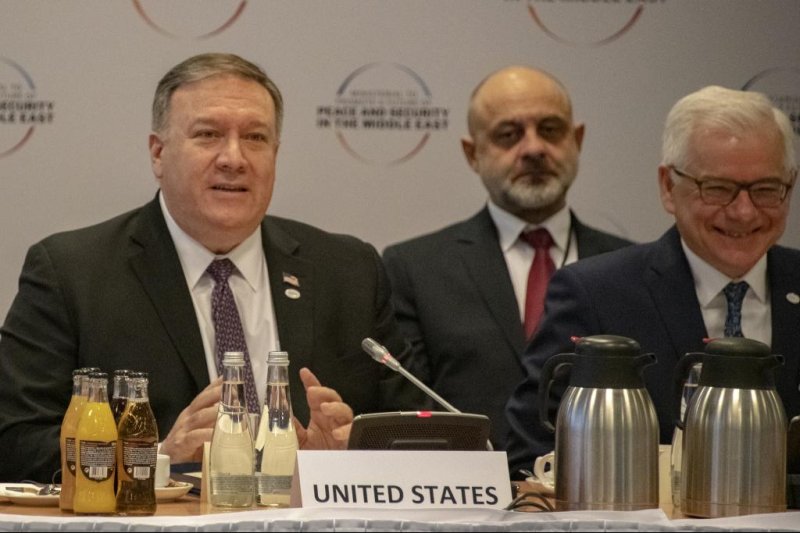1 of 4 | U.S. Secretary of State Michael Pompeo participates Thursday in the Opening Plenary of the Ministerial to Promote a Future of Peace and Security in the Middle East, in Warsaw, Poland. Photo courtesy U.S. State Department
Feb. 14 (UPI) -- At a Mideast summit in Poland Thursday, Secretary of State Mike Pompeo urged foreign leaders to confront Iran and abandon the 2015 nuclear deal, as the United States has done.
Pompeo told delegates from more than 60 countries that the world "can't achieve peace and security" without confronting Iran. He said "pushing back" against Iran is central to solving other problems in the Middle East.
Vice President Mike Pence also spoke, urging European countries to withdraw from the Obama-era nuclear deal, and back U.S. sanctions against Iran. He called the nuclear pact the "devil's bargain" and lashed out against Britain, Germany and France for creating special economic instruments to get around sanctions.
"Some our leading European partners have not been nearly as cooperative," Pence said. "In fact, they've led efforts to break up our sanctions. We call it an effort to break American sanctions against Iran's murderous revolutionary regime. It's an ill advised step that will only strengthen Iran, weaken the EU and create more distance between European countries and the United States."
Pence said the sanctions on Iran are the toughest in history and will get tougher unless Tehran changes its stance.
Other topics of discussion at the summit include Israeli-Palestinian peace and the conflicts in Syria and Yemen. The controversial nature of the U.S.-led summit prompted Germany, France and other countries to send lower-level diplomats.
"Our hope is that every engagement will entail true back-and-forth dialogue, not just be a chance to recite prepared statements," Pompeo said. "We want to bring together countries with an interest in stability to share their different views and break out of traditional thinking."
The Trump administration's hard line on Iran started last year when the United States exited the nuclear deal and imposed the sanctions -- actions that fueled perception the Trump administration is pushing for regime change in Tehran, something Washington leaders deny.
"Iran is a country you can't rely on, do business with, can't trust," Rudy Giuliani, President Donald Trump's attorney, told USA Today.
Iranian expert Pooya Dayanim, in a blog post for the Atlantic Council, a Washington-based think tank, warned regime change may not net the results the West wants.
"An uncontrolled and unintended collapse of the Iranian regime will further destabilize the Middle East and further push back the hopes and aspirations of the Iranian people for democracy and freedom," Dayanim wrote. "However, Iranians revolted 40 years ago and didn't get the regime they were hoping for. If the Iranian people are to suffer through more sanctions or are to risk life and limb, they need to know why they are doing so and what future awaits them."
Israeli Prime Minister Benjamin Netanyahu, who was also set to speak at the conference, has long called for a confrontation with Iran but has stopped short of calling for war.
"It's a conference that united the United States, Israel, many countries in the world, many countries in the region, Arab countries, against Iran's aggressive policy, it's aggression, its desire to conquer the Middle East and destroy Israel," Netanyahu said.
Several countries are skipping the summit, including Russia, China and the Palestinian Authority. Iranian officials called it an anti-Iran "circus." Complicating matters is a suicide attack in southeast Iran Wednesday killed 27 troops of the Iranian Revolutionary Guard. A Sunni militant group claimed responsibility for the bombing.
Russian President Vladimir Putin held a summit of his own in Sochi, Russia, Thursday that includes Iranian President Hassan Rouhani and Turkish President Recep Tayyip Erdogan. The leaders gathered to discuss the future of Syria.















